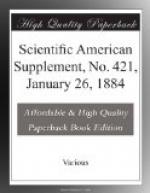of an ignorant teaching and vulgar prejudice that
feeds and clothes the charlatan and ascribes to savage
and uncultured races an occult familiarity with pathological,
physiological, and remedial effect unattainable by
the most advanced sciences; and whereby the Negro,
Malay, Hindoo, South Sea Islander, and red man are
granted an innate knowledge of poisons and their antidotes
more than miraculous. A reward of more than a
quarter of a century’s standing, and amounting
to several thousand pounds, is offered by the East
India Government for the discovery of a specific for
the bite of the cobra, and for which no claims have
ever been advanced; and the “snake charmers”
or jugglers in whom this superior knowledge is supposed
to center are so well aware of the futility of specifics,
and the risk to which they are subjected, that few
venture to ply their calling without a broad-bladed,
keen-edged knife concealed about the person as a means
of instant amputation in case of accident. Medical
and scientific associations of various classes, in
Europe, Australia, America, even Africa, and the East
and West Indies, have repeatedly held out the most
tempting lures, and indulged in exhaustive and costly
experimentation in search of specifics for the wounds
of vipers, cobras, rattlesnakes, and the general horde
of venomous reptiles; and all in vain. Even the
saliva of man, as well as certain other secretions,
is at times so modified by anger as to rival the venom
of the serpent in fatality, and it has no specific;
and a careful analysis of the pathological relations
of such poison proves that further experimentation
and expectation is as irrational as the pursuit of
the “philosopher’s stone.”
It is an indisputable fact, however, that there are
individuals whose natural or acquired idiosyncrasies
permit them to be inoculated by the most venomous
of reptiles without deleterious or unpleasant results,
and Colonel Matthews Taylor[7] knew several persons
of this character in India, and who regarded the bite
of the cobra or tic paloonga with nearly as much indifference
as the sting of a gnat or mosquito. Again, in
1868, Mr. Drummond, a prominent magistrate of Melbourne,
Australia,[8] met with untimely death under circumstances
that attracted no little attention. An itinerant
vender of nostrums had on exhibition a number of venomous
reptiles, by which he caused himself to be successively
bitten, professing to secure immunity by reason of
a secret compound which he offered for sale at a round
figure. Convinced that the fellow was an imposter,
and his wares valuable only as a means of depleting
the pockets of the credulous, Mr. Drummond loudly
asserted the inefficacy of the nostrum, as well as
the innocuousness of the reptiles, which he assumed
to be either naturally harmless, or rendered so by
being deprived of their fangs; and in proof thereof
insisted upon being himself bitten. To this experiment
the charlatan was extremely averse, offering strenuous




